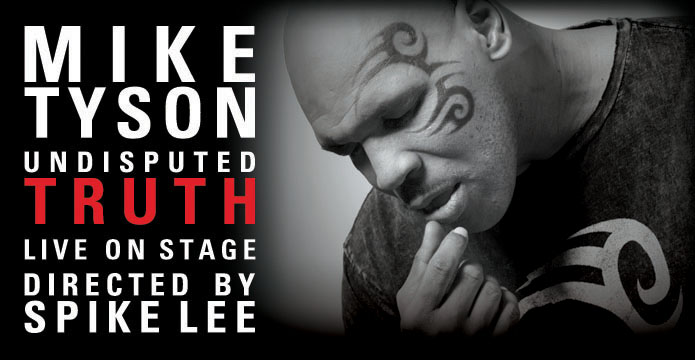Your six episode series Being Mike Tyson with Fox Sports follows you as you perform Undisputed Truth across the country.
Tyson: It's a lot about reflecting. I go to the prison where I spent three years (the Plainfield Correctional Facility in Indiana) and go make amends with my warden. It doesn't give you closure; it's an interesting dynamic process that I had to experience in my life. It was good for me to do that. It's something I had to do for me; I didn't do it for no one else.
In the series, you meet with Muhammad Ali, whom you've described as one of your great personal heroes.
Tyson: It was just wonderful spending time with him; I just enjoy being in the man's presence. When you're with him, you realize you're in the presence of someone really special, from a humanity perspective. I've been friends with him many years, since I was 19. It's always a great experience. When I was in a juvenile detention center, Mohamed Ali came to visit and that was the first time I had any information I wanted to be a fighter.
In the past few years you've had a different kind of public persona emerge in the media.
Tyson: Tell me about it.
The Hangover showed a much lighter, more comedic side of you and that seems to have carried over into other parts of your perception by the public.
Tyson: I deal with a great self hate image of myself. So I'm working day by day on liking that image of myself. Regardless of how I act or feel with a low opinion of myself, I know that I'm a great performer. My objective is still to perform magnificently. I want to perform great and that doesn't hold me back in my performance, but it's there in my everyday life and living.
How do you feel about the difference performing for a live audience versus performing for camera?
Tyson: I'm a stage performer; I'm at my best in front of a crowd of people feeling their energy when they can tell me what they want without talking. If I'm in the ring, I know what you want without opening your mouth; your energy tells me what you want. It's like you're talking to me telepathically when I'm on stage or in the ring. On a film, I have to dig deep inside; when I dig deep inside, I'm digging for nothing. I'm digging for no applause, I'm digging for no accolades so I'm trying to find out what I'm digging for. I'm a very shallow person, I'm very physical; I have to have the audience, I have to see the people's faces, I have to feel their energy. It's a relationship; they have to talk to me. It's hard to talk to a camera; it doesn't reflect anything back.
Do you see yourself continuing to work in film, even though it's a different working experience than the energy of live performance?
Tyson: One hundred percent, one hundred percent. My life is the energy of other people, that's how I exist, through other people's energy. Without them, I'm nothing. I'll do acting, I'll do good in movies too, but I'll never be my best. I'll never be my one hundred percent or two hundred percent best.
Do people approach you differently since Undisputed Truth?
Tyson: You know what, you run into kids, 15, 16 that say to their parents "Hey, Ma, look: that's Mike Tyson the actor." And their parents have to explain to them, "No, he's a world champion boxer." A lot of people don't see me like that; they see me as the champ, "The Baddest Man on the Planet" or whatever the hell they called me back then. Then the younger generation sees me as an actor. It's really interesting, a really strange dynamic, even to myself. Some people are just not adaptable no matter how great they are, the only flaw they have is no adaptability. I'm a street kid, I'm a gutter kid. I'm from the sewage. My whole life is about adaptability; every step I make is one step out of the sewer and that's in every aspect of my life. My sewer is not the ghetto now: it's a sewer in my mind. Every time I succeed, I'm out of that sewer in my mind.
Check out Mike Tyson: Undisputed Truth on Thursday, October 10 at Oakland's Fox Theater! And Being Mike Tyson on Tuesdays on Fox Sports 1.


